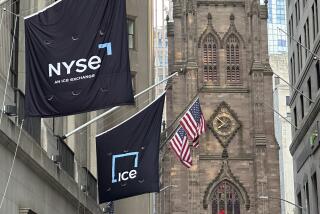The Players: How They Might Fare in a Downturn
- Share via
SAN FRANCISCO — The impact of an economic slump on the electronics industry will be very uneven, analysts say, with some sectors and companies continuing to prosper while others suffer severely.
Vulnerable companies include the mostly American firms that sell minicomputers, large machines that are being squeezed between powerful desktop systems on the low end and high-performance mainframes and supercomputers on the high end. Not only have Data General, Wang Laboratories and Prime Computer been suffering large losses, but even Digital Equipment is encountering serious problems after years of rapid growth and big profits.
International Business Machines, by contrast, should be able to avoid the worst, despite its traditional reliance on large computers. The firm will get a boost next year from its new generation of mainframe computers and has been rapidly increasing its revenue from software. And because it is present in virtually all sectors of the business, including personal computers, it is not too vulnerable to weakness in one area.
* In personal computers, growth in the $25-billion U.S. market has slowed to 5%, according to many analysts, down from just over 10% last year. IBM and Compaq Computer have profited from the transition to more powerful machines based on the latest microprocessors from Intel, and Compaq’s strong market position and management should allow it to cope well with a downturn, although its rapid growth may slow.
The future of Apple Computer, which will unveil three low-priced versions of its Macintosh next week, is a subject of debate. Bob Puette, president of Apple’s U.S. operations, believes that there will be an economic slump but that Apple can benefit from it.
“It’s going to be a great period to gain market share,” he said. “We have a stream of great new products coming, and when you have that in a soft market, you can gain market share.” He noted that Apple had been able to manage the drop from 50% annual growth in the mid-1980s to 10% growth last year, while maintaining its profit margins.
“Some people think Apple is in a weak position, but they have created their own product cycle,” said Stewart Alsop, publisher of the PC Letter.
But Charles Ferguson, a research associate at MIT and technology adviser to the Boston investment bank Tucker Anthony, contends that the Macintosh product line has been pushed about as far as it can go, and that it will be severely hurt by Microsoft’s Windows, a software program that gives IBM-compatible PCs many of the graphics features that made the Macintosh popular. And a recession is not necessarily the best time to shift to a low-price, high-volume sales strategy, as Apple is doing.
* Whatever its effect on Apple, Windows should help Redmond, Wash.-based Microsoft glide through a recession. In general, analysts expect software, which is necessary to get the most out of equipment that has already been purchased, to fare better than hardware during an economic downturn.
For similar reasons, vendors of local-area networks such as Novell Inc. should do well. Networks linking computers within an office help customers get better productivity from computer investments, and the market for such systems is growing 30% annually.
In personal computers, software and networking, Japanese firms are not nearly as strong vis-a-vis their U.S. rivals as they are in semiconductors. But they have a very strong position in small portable computers--the fastest-growing piece of the business--and they supply important parts such as screens, disk drives and power supplies for PCs made by American firms. Ferguson and others believe that they will use these strengths as a wedge to enter the PC mainstream at the first opportunity.
* In the notoriously volatile chip business, Intel and Motorola are clearly the best-positioned of the U.S. firms. Intel has established its x86 line of microprocessors as the standard for PCs and cannot keep up with demand for its hot-selling 386 and 486 chips.
Intel will spend $600 million this year--and more next year--on new capital equipment, and Executive Vice President Craig R. Barret said the general economic outlook would not affect its capital spending budget.
Motorola, with a similarly strong position in microprocessors and a large communications equipment business, is also in good shape. Smaller chip companies that concentrate on small markets--and chip-design firms that contract out their manufacturing--should be able to avoid the worst, analysts say.
But several large, old-line semiconductor companies, including National Semiconductor and Advanced Micro Devices, could be in deep trouble. Charles Sporck, president of National Semi, said his company had cut its capital spending plans for this fiscal year by 40% as a result of the weak economy.
“Companies that have heavy fixed overhead are going to be under pressure,” said Mel Phelps, semiconductor analyst at Hambrecht & Quist in San Francisco.
But Japanese semiconductor giants such as NEC, Toshiba, Fujitsu and Hitachi, which make a broad range of electronics and thus are their own best customers for chips, should be better positioned to ride out the storm.






